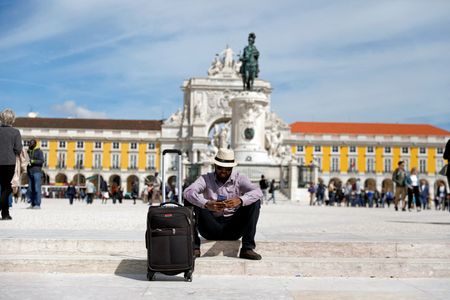By Catarina Demony
LISBON (Reuters) – Investments through Portugal’s “golden visa”, which gives wealthy foreigners residence rights, jumped nearly 50% last month, data showed on Sunday, as the government considers whether to scrap the controversial scheme.
The golden visa has been heavily criticised at home for sending house prices and rents up, and the European Commission has called for the end of such national programmes.
In Portugal, it has attracted 6.6 billion euros ($6.95 billion) in investment over the past decade, mainly from China, Brazil and Turkey, with the bulk of the money going into real estate.
To apply, non-EU nationals must make a significant investment in Portugal, such as buying real estate. They are then given residency rights and are allowed visa-free travel throughout Europe’s Schengen area.
But Prime Minister Antonio Costa said on Nov. 2 his government was going to evaluate the 10-year-old scheme, questioning whether the programme could still be justified.
Murat Coskun, Get Golden Visa CEO, said Costa’s comments had had a “significant impact on the appetite” for the measure, with his company seeing a five-fold increase in inquiries.
Data from border agency SEF on Sunday showed investment through golden visas increased 48% in November from October to 65 million euros, and was up 41% from a year earlier.
Vasco Silva, the CEO of Kleya, which helps foreigners move to Portugal, said his company had received many queries about what was going on, adding that some investors had rushed their decision just incase the programme was altered or binned.
“If there is no residence by investment programme, (investors) will simply ignore the country,” Silva warned, arguing the more than 10,000 visas issued since 2012 had put Portugal “on the map”.
The Portuguese branch of anti-corruption group Transparency International (TI) has said the programme could be used for money laundering, while the European Commission has said it considers such schemes a potential security risk.
Silva said that was not the case because those involved in the process, from banks to lawyers, had to comply with “very strict rules”.
“We are not allowing entrance to criminals or money for which we do not know the source,” Silva said. “Exceptions can happen but it will be one in 10,000 or two in 10,000 and of course those are the ones that go public.”
Britain scrapped golden visas in February following the Russian invasion of Ukraine amid concerns about the inflow of illicit Russian money. Portugal suspended golden visas for Russians, but 431 had already benefited from the scheme since the time of its launch, according to SEF.
($1 = 0.9497 euros)
(Reporting by Catarina Demony; Editing by Crispian Balmer)

